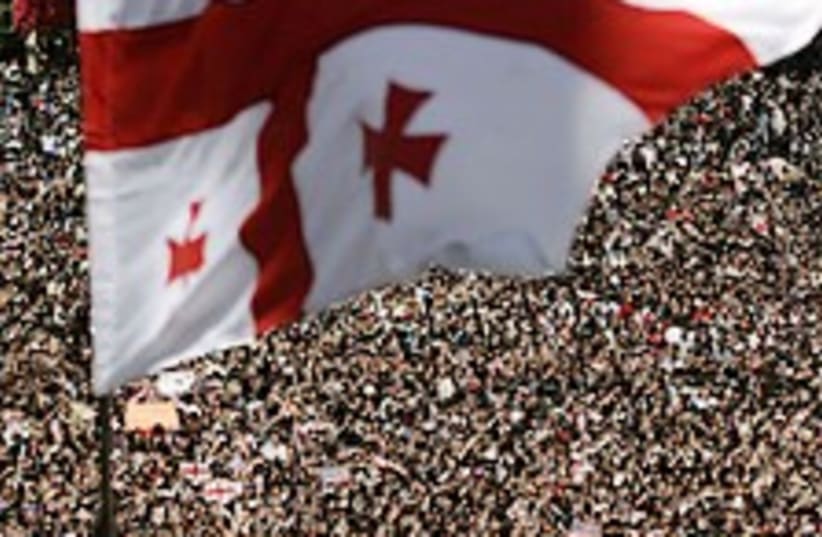Georgia yearns for warm Western embrace
What will Georgia do if Russia recognizes Abkhazia as an independent state?
"Everything the Russians could do to us, they've already done. The only option they have now is war," Temuri Yakobashvili, Georgian minister for reintegration, says matter-of-factly.
Yakobashvili is a sign of the "new Georgia" - a large man who calmly fingers prayer beads as he speaks, a Jew who never lived in Israel but speaks fluent Hebrew, a former head of a strategic think tank who is now responsible for the country's most delicate diplomatic game. He faces a vast Russian adversary in Georgia's bid to maintain control over two regions, Abkhazia and South Ossetia, in which the Russians are supporting separatist groups.
Confronted with Kosovo's declaration of independence on Sunday, Russia has been threatening the international community that it would take the "precedent" of Kosovo to its logical extreme by recognizing other "new states," including the two Georgian areas and a piece of Moldova.
However Georgia's senior leadership is unfazed by the Kremlin's threats.
The Jerusalem Post spoke to Yakobashvili during a weekend spent as the government's guest, accompanying a visit of the Conference of Presidents of Major American Organizations.
What will Georgia do if Russia follows through on its threat to recognize Abkhazia as an independent state?
"We will turn to international structures and say that Russia is an aggressor," says a sanguine Yakobashvili.
If that doesn't help?
"What can we do? We will draft the army."
Yakobashvili's calm is shared by other cabinet members, including Defense Minister David Kezerashvili, (two years on the job, he is 29), who has overseen a two-year process in which Georgia's army has more than doubled in size, received heavy American training and purchased advanced Israeli weapons systems.
(Kezerashvili, too, is Jewish, understands Hebrew and in his childhood lived in Holon. As President Mikhail Saakashvili told the visiting Jewish delegation with a smile, "In Georgia, both war and peace are in the hands of Jews, a situation we share only with Israel.")
The threat is not easily dismissed. The country's longest border, comprising its entire northern frontier, faces Russia, which looms mightily over tiny Georgia, population five million.
In 2006, after the Georgian government caught a group of Russian spies and publicly released them into the hands of the Organization for Security and Co-operation in Europe, an incensed Kremlin cut all relations, road and rail links and direct flights with Georgia, and imposed economic sanctions that continue to this day. It even unceremoniously deported Georgians living in Russia.
It is against this background that Georgia's government has spent the years since the 2003 Rose Revolution charting a new course, one that sees a deep integration into the economy, culture and political institutions of the West, with a particular emphasis on the US and Israel. It now seeks NATO membership, a goal that remains elusive in the near future and only serves to further irk its northern neighbor.
The strengthening of the relationship with the Western alliance is being held up by European fears related to Article 5 of the NATO Treaty, which obligates NATO countries to aid, including militarily, a member state that is attacked.
Israel's path to a closer relationship with NATO, though filled with a steady stream of diplomatic promises, has also been restricted by this concern. European states are worried that a flare-up between Georgia and Russia could lead to a NATO-Russian confrontation. Russia also has the strategic leverage of being a major European gas supplier.
But even putting strategic realities aside, Georgia's Western orientation is real.
"Of course we are Europeans," said one official, "so it's only natural that we see ourselves as part of European and Western international structures."
The country's president explains the desire for European Union integration by saying it "charts our irrevocable course toward a fully Western future."
Indeed, the Georgian response to its aggressive neighbor has been to seek every possible means of strengthening ties to the West.
The Georgians have been conquered many times by Russians, Arabs, Mongols, Turks and Persians over many bloody and bitterly remembered centuries.
For this reason among others, Georgians seem to identify naturally with Israel.
Wandering into a café run out of the living room of a family in the picturesque mountainside neighborhood of Old Tbilisi, one faces a torrent of broken but animated English. Georgians serve conversation with a side of coffee.
"We never had problems with the Russians," says a middle-aged woman in a red shawl. "But we have a problem with Putin. Why does he have to bother us? We're a different people. Of course," she adds, waving at the Israeli guests, "every nation has land troubles. Like with us, why don't they let you live in peace?"
if(catID != 151){
var cont = `Take Israel home with the new
Jerusalem Post Store
Shop now >>
`;
document.getElementById("linkPremium").innerHTML = cont;
var divWithLink = document.getElementById("premium-link");
if(divWithLink !== null && divWithLink !== 'undefined')
{
divWithLink.style.border = "solid 1px #cb0f3e";
divWithLink.style.textAlign = "center";
divWithLink.style.marginBottom = "40px";
divWithLink.style.marginTop = "40px";
divWithLink.style.width = "728px";
divWithLink.style.backgroundColor = "#3c4860";
divWithLink.style.color = "#ffffff";
}
}
(function (v, i){
});

